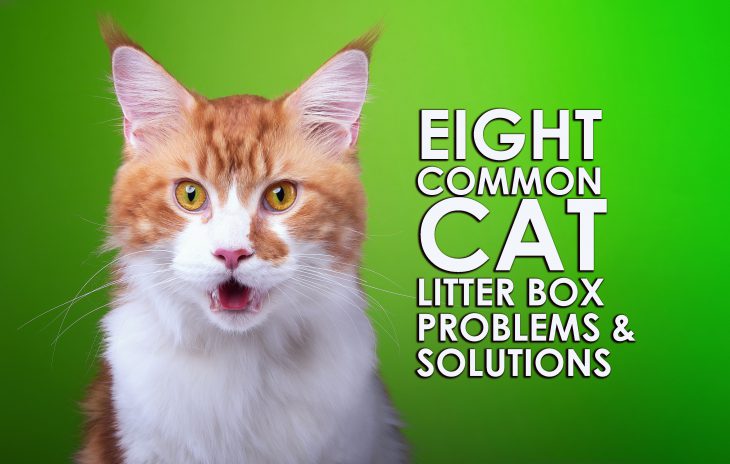Typically, cats are very good at using litter boxes. In most cases, they only need to be shown once, and they instinctively know what to do. There are instances when a cat might refuse to use the litter box. In fact there are quite a few reasons, but most of the time a cat’s refusal to use the litter box can be attributed to these eight common problems.
1. Problem: A dirty litter box.
Solution: Clean your cat’s litter box daily. Wash the litter box weekly. Avoid using scented soaps, your cat(s) may not like the scent. Instead, wash the box with baking soda or an unscented soap.
2. Problem: One litter box. Many cats.
Solution: Cats are very particular about their litter boxes. If you have two or more cats, you should get one box for each cat.
3. Problem: The litter box is too small for your cat, and/or your cat is having problems getting in and of the box.
Solution: This one is easy. Simply upgrade to a larger box, but don’t change the litter. Some cats like the litter they had when they were kittens.
4. Problem: Too much litter in the box.
Solution: As a rule of thumb, most cats prefer one to two inches of litter.
5. Problem: Some cats like a certain location for their litter box. Therefore, if the box is moved to another place in the house, your cat might avoid using it.
Solution: Keep the litter box in a place in your home that your cat likes.
6. Problem: If your cat is suffering from a Urinary Tract Infection (UTI), it will enter the litter box and urinate in small amounts. A cat with a urinary tract infection might also urinate outside the box.
Solution: Take your cat to a veterinarian. Most cases of UTI are usually taken care of with antibiotics. After a few days of receiving treatment, your cat should feel better and return to using the box. In addition, you can try changing your cat’s diet to include food formulated to improve urinary tract health such as Royal Canin Veterinary Diet Urinary SO Feline, or Purina Pro Plan Veterinary Diets UR St/Ox Urinary Formula Adult Cat Food .
7. Problem: If your cat is suffering from Feline Interstitial Cystitis (FIC), it will tend to urinate outside of the box. FIC is a neurological disease that affects a cat’s bladder. Cats with this disease will try to urinate frequently and there might be evidence of blood in their urine. FIC is a life-threatening disease. Contact your veterinarian immediately if you suspect your cat has Feline Interstitial Cystitis.
Solution: Your veterinarian may recommend some pain medications, and a change in your cat’s diet. Since Feline Interstitial Cystitis is stress-related, your veterinarian may also recommend a pheromone such as Feliway.
8. Problem: A cat suffering from Kidney Stones or Blockage will use the litter box more frequently. It may also cry or meow in pain when trying to urinate.
Solution: Take your cat to a veterinarian if it is exhibiting these symptoms. Most treatments require medication that will dissolve the stones. In severe cases, the veterinarian may have to remove them which will require hospitalization. You can also feed your cat food formulated to help promote kidney health such as Prescription Diet k/d Feline Kidney Care with Chicken, or Purina Pro Plan Veterinary Diets NF Kidney Function Formula Advanced Care Adult Cat Food.





